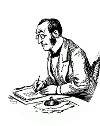Sam Marchiano and the 1755 Bray Diary Find
Property "Version" (as page type) with input value "{{{Version}}}" contains invalid characters or is incomplete and therefore can cause unexpected results during a query or annotation process.
Comments
<comments voting="Plus" />
“March 31, 1755 – Went to Miss Seale’s to play at Base Ball . . .”
It was the summer of 2006. If you insisted on strictly provable evidence (not all of us actually did), the earliest appearance of the term “base ball” was to be found in a 1796 description of “Englische base ball” by the German writer Johann Gutsmuths. That threshold was about to be pushed back 40 years, and suddenly. And neither snazzy high-tech digital searches nor dogged library digging would have anything to do with it; instead, the key finders were an American documentary director from New York City, and a sharp-eyed English lady who lived snugly in a 1500’s house in southern England. That summer, MLB.com’s Sam Marchiano was at work on what was to become her award-winning film Base Ball Discovered. One day she and her small crew were in Horsham England, filming predecessor games that persist in England yet -- stoolball and rounders. And thus on this fateful day, an eager collection of teenage girls enjoyed a game of rounders in front of an American film crew, and that crew itself was the subject of interest by a second camera crew, this one belonging to a BBC South news crew. Late that afternoon, Tricia St. John Barry happened to glance up to spot BBC News covering the Americans covering schoolgirl ballplaying, and she understood the BBC reporter to claim that the term “base ball” was known back to the 1790’s. But Tricia knew better than that. So she called BBC South. BBC South then called Sam. About 20 years earlier, Tricia St. John Barry had heard from a friend who was making storage space in an old shed by discarding some really ancient piles of paper, with the help of a bonfire. Already being known as fond of really old things, Tricia had stepped in and salvaged what turned out to be an ancient diary by the 19-year-old William Bray. His entry for March 31 was a one-sentence record of a day that was evidently highlighted by church attendance, by drinking tea into the evening, and playing “base-ball” with six young ladies and four young gentlemen (see http://protoball.org/1755.3). Tricia had been planning to transcribe the whole 1755 diary at some point, but the time to do that was never quite right. But that “base ball” reference had caught her attention, and while not a lover of sport, she had remembered the term. Thus, Sam Marchiano suddenly became an effective first-line origins researcher as well as documentarian. She would soon work this happy new find into the documentary itself. We recently asked Sam about the find:
Protoball: What were your immediate thoughts when the call came in from BBC?
Sam Marchiano: I was surprised. I knew, of course, that what we were doing was only on the fringe of mainstream interest. I thought, “how very British and how very smart!”
Protoball: What had that day been like, up to then?
Sam Marchiano: The day was mainly a blur because one of our crew members had gotten into a minor car accident and so I was dealing with all the shoot logistics plus insurance issues. I was terrified of costing MLB a lot of money, and what that might mean.
Protoball: What were your thoughts when you read the actual diary text?
Sam Marchiano: That came a lot later, because Tricia couldn’t actually locate the diary right away, and I had to leave for home. Luckily, David Block was still in England and he helped handle the filming of the actual manuscript once it did turn up. My main thought when I read it was that I wished there were more! But then we all got caught up in squeezing full meaning from what was there on the page.
Protoball: Once you had spent some time with a few origins-mad researchers, what did you think of this odd little band of diggers?
Sam Marchiano: It didn’t change anything. I just liked everyone even more on a personal level. Searching for knowledge and truth is the most awesome pursuit. Whether it’s the origins of baseball of the meaning of life, it’s all the same.
Protoball: How does it feel to have been the principal actor in the finding of what was perhaps the earliest tangible evidence of English base-ball? Do you become tired of autograph seekers?
Sam Marchiano: Hah. I just keep hoping someone will actually add the find to the wiki page on William Bray. It’s the only way that the find really counts, right . . . if it’s got a good wiki page?
Protoball: How did you ever get interested in baseball’s origins?
Sam Marchiano: Through seeing vintage baseball, which by any measure is fun to watch. Then I read somewhere – either in David’s 2005 book or in Martin Hoerchner’s UK SABR newsletter – that baseball’s precursors were still being played, and could be filmed. But ultimately, I loved the idea of being able to help shatter an invention myth and put things in an evolutionary light.
Protoball: What surprised you most about the reception to Base Ball Discovered?
Sam Marchiano: That MLB Network aired it.
Notes: for a free video clip of Sam describing her documentary, go to:
http://mlb.mlb.com/mlb/mediacenter/baseball_discovered/whoswho.jsp; for David Block’s longer account of the Bray find, go to his short paper “The Story of William Bray’s Diary,” Base Ball, volume 1 number 2 (Fall 2007), pages 5 -11. To obtain the the documentary itself on ITunes, go to https://itunes.apple.com/us/tv-season/base-ball-discovered/id385353782.
